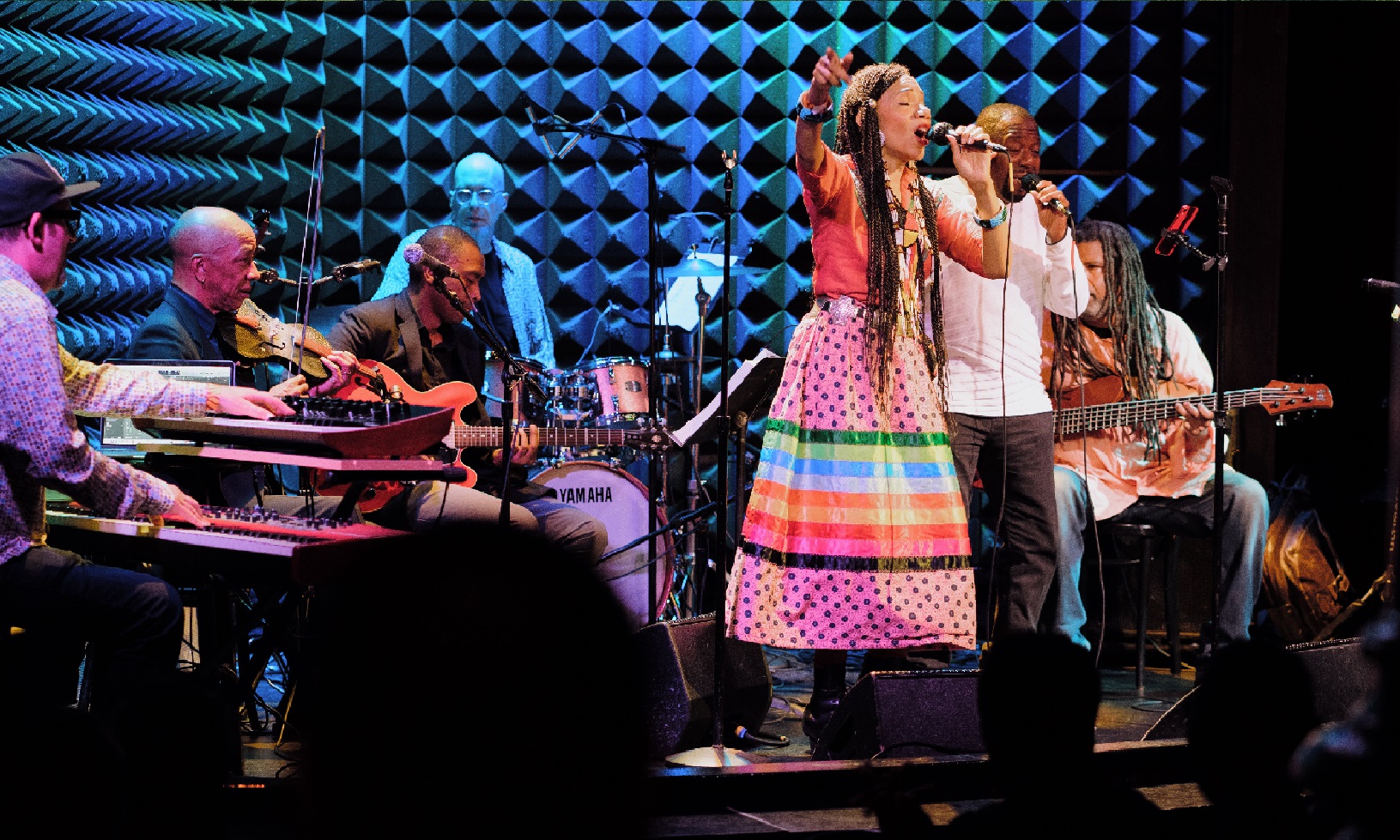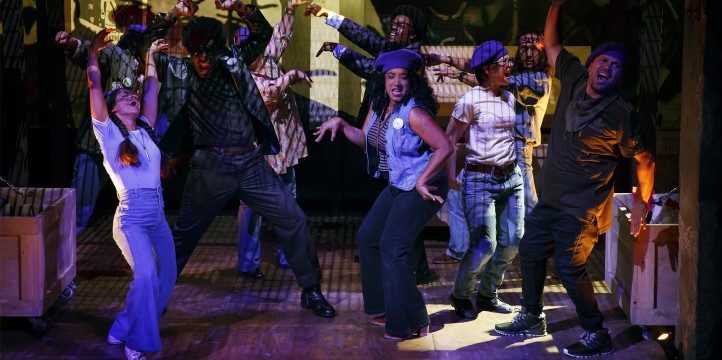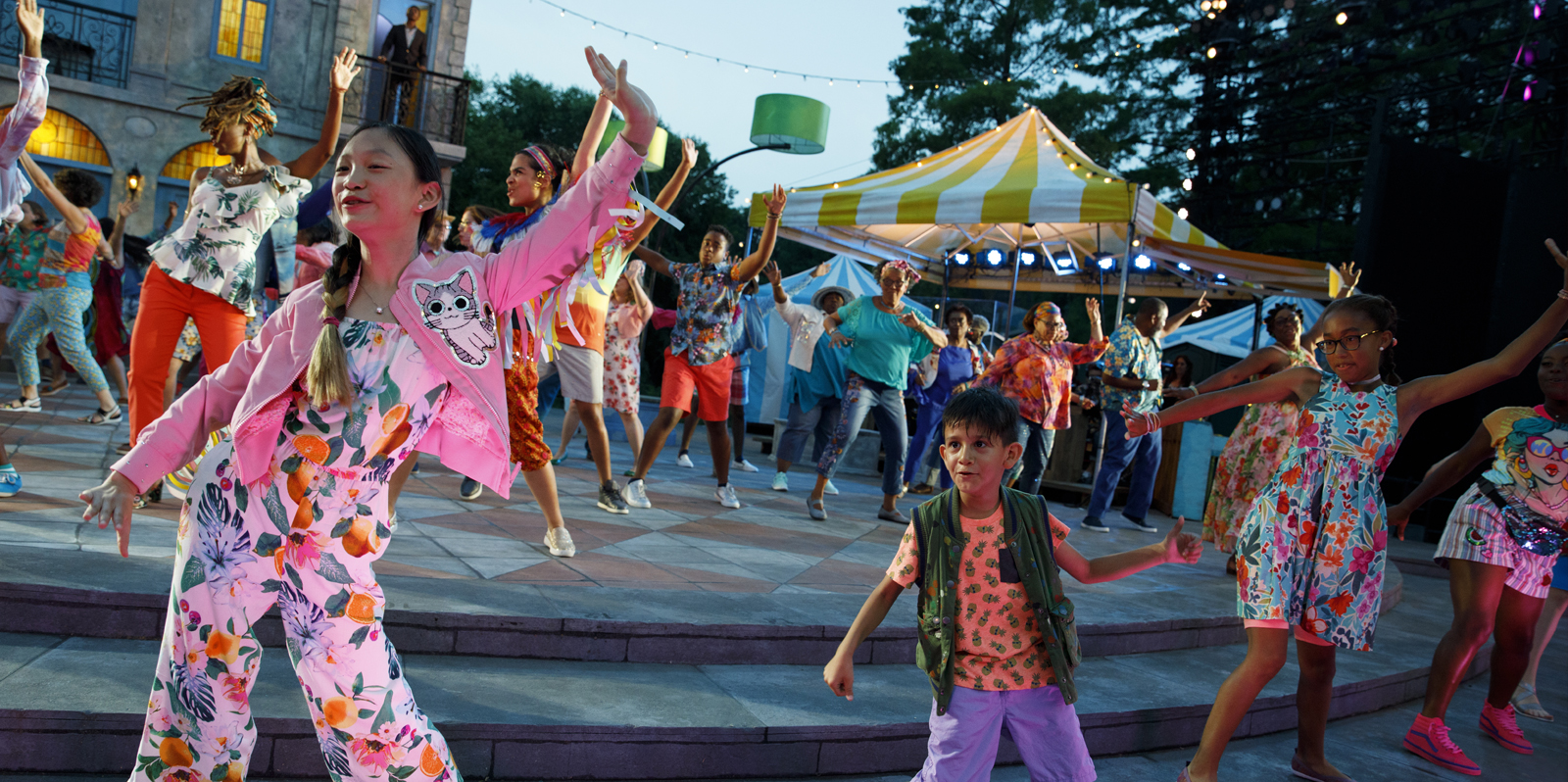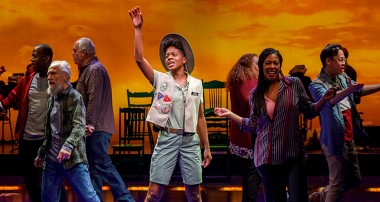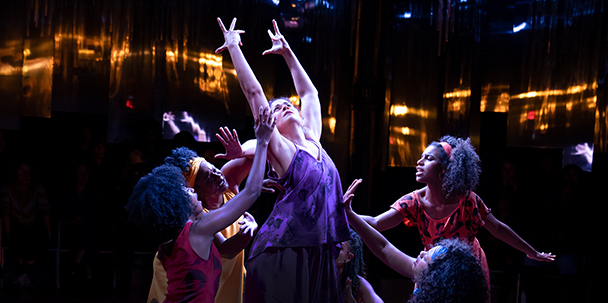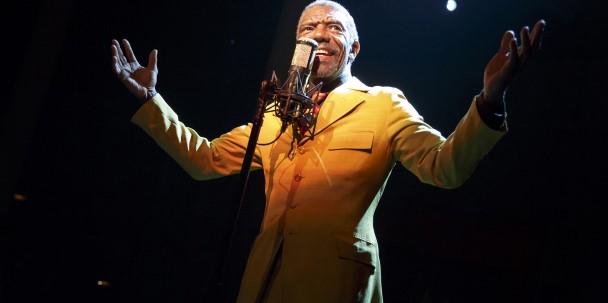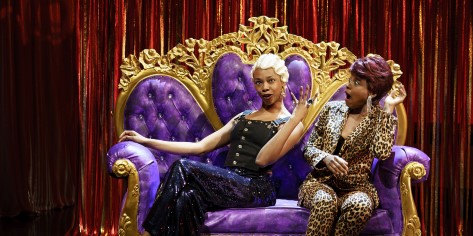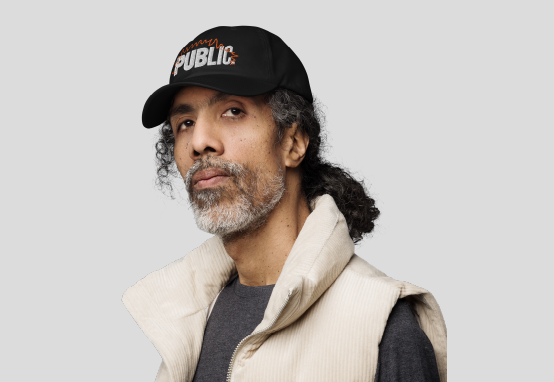Zoë Kim: Any idea what the run time might be for this? Can’t wait!
Else Went (EW): I know this wasn’t an official question, but it’s important so I’m going to answer it here. Initiative is long. It runs about four hours with several breaks throughout. I know it’s a long play, but I believe in you as much as I believe in it, and I believe in it with all my heart.
AriDy Nox: What are some of the core intentions behind Initiative, and behind your playwriting project more broadly?
EW: Initiative is a special play to me, and the offering it has to make is probably my most earnest and full-throated. I first wrote the play as a sort of letter to my teenage self, an apology and a forgiveness for the ways I mistreated myself when I was young. There are so many stories about young people, but it seems to me that their stakes are almost always too low. We encounter so many essential moments of humanity for the first time in our teens: love, desire, betrayal, identity, ambition, mortality, and the intensity of those encounters always feels like it is played down, by adults at the time and by ourselves in our later years, because we feel there is something vaguely shameful about being or having been young, and about feeling intensely. Initiative is my attempt to take the lives of young people, particularly my own life as a young queer person with no language to know myself, and the lives of my first friends, my first loves, and treat them with dignity and respect. To give them the full scope of humanity, which is ultimately my goal in everything I write: to offer the full scope of humanity to those who are not typically afforded it in the stories we hear told.
Amrita Ramanan: How do you take the seed of an idea, a story, or an instinct and manifest it on the page?
EW: I’ve forgotten. I forget every time. I know that I used to begin with place. I would consider a place, and imagine who would occupy it, and what their need was, and how the space would be able to provide it or not. These days, though, I think I just wait until I’m really troubled (which in the current climate doesn’t ever take too long) by a question which has no solution, and then I try to illustrate the question being asked in as many ways as possible until I find a play.
Ying Ying Li: Else, you write impossibly well. Can you prove that you are mortal by providing a few vignettes of when you were writing Initiative? For example, “I was at a local coffee shop, mouthful of muffin, tapping away feverishly, with a man bluetoothing business beside me, and it weirdly helped.”
EW: I’m definitely a human mortal who puts their pants on both legs at the same time like anyone else. I can’t prove it with coffee shop stories because I’m sort of terrible to be around while I’m writing. I get obsessed as soon as the words start coming, and very moody when they stop. I do a lot of pushing my chair out and standing, hammering at the keyboard. I read everything out loud, often as I’m typing it. I have a regrettable pattern of tobacco use to break up long workdays. I think I romanticized a lot of slightly toxic images of the writers whose work influenced me, because process is form is content. What I’ll say about my writing practice as it has developed over the years is that I am now able to do the Sisyphean game of it, to sit down at 11AM with the second coffee and a loose plan of attack, and to stay there until 5PM or whenever the battle is won. But as much as I value that discipline, most of the pages that never go anywhere (and there are plenty) come from that method, whereas the plays that come over me like fevers, that steal my appetite and leave me sweating, I admit they don’t feel entirely mortal, and that’s why I do this; I mean, there’s no better feeling than falling back into your body after having relinquished it to something greater.
Katie Do: When trying to locate the humanity of a character whose values you don’t share, how do you dig deeper into their perspective and find what they need to soften?
EW: Thank you for this question. I’m not very interested in drawing moral conclusions in my stories, because in my experience people are not morally consistent; we’re much more interesting than our ideals, and ultimately we’re all frail, comfort-seeking little animals most of the time. When I witness a person who is lashing out or causing some sort of harm to themselves or others, I try to figure out what is the perceived threat that makes them behave this way. The container of a play provides space to try dangerous things we wouldn’t explore in real life. To me, that means that one of the more dangerous things I can do as a writer is agree with, or at least entertain, beliefs and values which appall me when expressed by real people, and try to trace those beliefs back to the point where a foundational truth was first twisted. If I can manage that, then best case scenario the character and the audience touch that truth at its root together, and there can be this transcendent moment of simultaneous judgment and forgiveness, of both the self and the other. I think that’s my understanding of catharsis, which has of course been the goal of drama for thousands of years.
Aya Abdelaziz: Your plays explore some of the loneliest corners of human experience, and somehow your writing is still wildly funny. What nourishes your spirit? What makes you laugh?
EW: What I really think is funny, like what busts me up, is when something is highly decorative and barely functional. For instance, I got my friend a teapot for their birthday which was shaped like a portly dinosaur dressed in fly-fishing attire, and the tea pours out the dinosaur’s mouth. Rather than a calm stream of tea, though, the pot is designed in such a way that when you pour, the tea chaotically expels itself from all around the lip of the mouth, so that it looks like the dinosaur is projectile vomiting. It brings me to tears, every time, even thinking about it. He’s just trying so hard. And maybe there’s some sort of optimistic nihilism in that, of finding joy in the deeply unnecessary things we create, but I dunno, it just makes me giggle. Now I realize I’ve spent most of my time describing a stupid teapot rather than talk about how my wife and partner Emma, whom I’ve had the great privilege to love and collaborate with for fifteen years (and who is directing this presentation of Initiative), has made it so that even in the loneliest moments of my adult life, I have never been alone. Her belief in me when we were kids, telling me one night “I don’t think anyone knows the limits of what you can accomplish,” her continued support of me in my transition and in my work, her bravery and rigor and kindness, her own artistic mastery of her craft, because of these, my spirit is full. Because of her, I could laugh at anything.
Julián Mesri: You have such a way with language, whether it be heightened Elizabethan verse or the Discord rants of incels. I am curious how you approach the different use of language and stylistic elements in your work, since it is both deeply verbose but also leaps off the page.
EW: Oh I fucking love language. My immediate family all speak a different type of English: American, Australian, and Bajan/patois, so growing up, I always had to pick pronunciations and I think it gave me an appreciation for the complexities of how thought and history inform speech, and a complete lack of reverence for “correct” use of language. This made me a terror to English teachers (I recall now with fresh vitriol being marked wrong for using ‘faux’ as a synonym for ‘artificial’ on a sixth grade vocabulary test), but it is my favorite tool as a playwright. I think it’s magnificent that in English we have so many words to choose from, yet the ones we choose reflect not just our intention to communicate something, but actually they can point at the type of person we are, and learning new words can enable us to become different people. Writing in verse is a dream because the rhythm brings phrases to mind you’d never think of without that structure, words you don’t even know you know until they’ve plopped into a metered line. Likewise, with the incel play you mention, Degenerates, I had to go and learn a whole dialect, hundreds of niche words which were all created within a community to define and justify the impossibility of their members ever receiving love. What I saw there, besides hurt people lashing out, was people creating and relying on language to make themselves inaccessible to help, like wrapping themselves in razorwire. Merely coming to understand that language and the way it is applied to the world felt like a form of self-harm. Language is so much more active and (con/de)structive than we often give it credit, so I try to find the best form and function of language to align with the content of a play. Thousands have said it before, although as many disagree, but I believe the how is the what.
Francisca Da Silveira: How would you describe the œuvre of Else and its relationship to canon? How does Initiative fit (or not fit) into that œuvre?
EW: I mean let me level here for a second, one of the first chats I had with [Associate Director of New Work Development] Jack Moore a few months into our EWG meetings was about this deep anxiety I felt that I had no real sense of what was meant by “An Else Play,” that there wasn’t a brand, or to be more charitable, a recognizable continuity to my work. And I’m not totally over that. I know my interests in form and content are diverse, for instance I’ve just had a reading of a historical comedy about trans medical care which is entirely in a British high-comedy milieu, and another about male loneliness and hyper-contemporary incel culture, and now this micro-epic ensemble play about teens playing D&D in 2000. Someone said that whatever Else Play you read first, the second will be a surprise. But if you asked me, and you did, where Initiative sits in my body of work, I would say it is my most serious and direct artistic conversation with the writers who tricked me into the theatre by moving me and shaping my soul. It is my first major offering to the canon, the script I hope might someday be considered within the legacy of American theatre from Belasco to Kushner.
Nissy Aya: One of my favorite parts of being in this cohort is we get to sharpen each other. I am very open about how your writing mollywhops me time and time again. You are such a strong, technically sound writer, and your commitment to the craft of dramatic writing is such an inspiration to me. Who and/or what inspires your writing?
EW: I genuinely love community feedback, which is probably why I’ve found myself in so many writers groups over the years. I find the differences of modality and subject matter and authorial intent to be so artistically stimulating, because it’s like, you bring in pages, and the ask of feedback is to stand behind you and see the play from the same place you see it. This is so different from being the recipient of a play, responding from the audience, and that’s a valuable and potentially transformative practice for a writer: you get to engage with the Why and How as much as with the What. Your deeply humanist approach and refusal to write into anything but brutal honesty has been revelatory to me. I think to a certain extent if we aren’t taking risks, then we’re just providing entertainment. Craft and technique one can practice, sometimes at the expense of honest storytelling, but I’m inspired by people who can bravely complete an artistic gesture. Even if it’s messy, just have the guts to push it all the way. Ambition and mess are inspirational. I’d always rather see a messy ambitious play than the well-built mundane.
UGBA: We talked about this once before, but I'm still curious, in what fashion do you wish to win your Pulitzer? Would you like it to be a widely agreed upon selection? Would you like it to be a scandalous often contested selection? How you want this magic to go?
EW: You take ‘26 and I’ll take ‘27, that way there won’t be any scandal. But I love that you’ve asked this, because I feel like when I talk about wanting to win a Pulitzer, there’s a sort of social unacceptability about wanting award recognition, a suspicion of playing to the shiny statues and crystal plaques. The reason I want that prize particularly is because when I was growing up in my rural California town, which is the subject of Initiative, there was so little access to theatre that one of the first ways I encountered plays was secretly reading Death of a Salesman after my mother said I couldn’t go see it at 13, for which I have since understood and forgiven her. After that, I decided that I might as well look at other plays which had won Pulitzer prizes, as they were likely to be good ones. This was my foundation in theatre, picking the plays out of the school and local library that I had found on that list. My true dream as a playwright, and the reason I want to receive a Pulitzer for drama, is that someday I want my work to be ubiquitous enough that a tattered copy of Initiative might be waiting on a high-school library shelf to offer itself to a kid who needs it and doesn’t know. Of course the trick is that I’ll never know if it happens. I can only work my hardest to make it the most possible.
Jack Moore: Else Went, just who the hell do you think you are?
EW: A threat.
No, really, I think I’m a person deeply in love, perhaps obsessed, with what I do, who is trying to become good enough at it to have a substantial and lasting impact on the legacy of the medium. So, a threat. I know there’s ego in this; there’s a strident exuberance in it that feels sometimes somehow wrong or dangerous to express. What if I come to nothing much at all? Oh I’ll look a fool then, won’t I, when I’m dead and buried and obscure?
Sarah Lunnie (SL): Does “Millennial” feel like a salient identifier for you, personally? How does your generational identity manifest in your experience of your life?
EW: I think generational identifiers are maybe useful for anthropology, certainly useful for corporations, and are largely detrimental for interpersonal relationships. I think that there’s something to the collective experience of being the first full-time inhabitants of the digital layer that has now integrated with everyday life, but I don’t know what it means to say that both I and Lauren Boebert are technically Millennials other than we experienced historical events at a similar age.
SL: You’ve written an ensemble coming-of-age drama that’s inextricably intertwined with a very specific historical period. Was that something you knew you wanted to take on, when you started writing? (The political history, I mean.) Or did you discover in process that the story of these young people’s adolescence is inseparable from the moment in which they are coming into adulthood?
EW: I knew that I wanted to write about my adolescence. I think it’s probably the case that all teens feel like fate has decided to radically change the world just as they have been asked to face inevitable adulthood, but there really was something about it being the millennium, right? And then we’re dealing with this absolutely unique innovation of the internet, allowing unprecedented public access to information and communication and anonymity, which comes just at the same time as the second significant attack on US soil in the country’s history, where the first led us to develop and utilize the atomic bomb, effectively bringing us into an era of constant potential self-annihilation. I didn’t go into the play intending to explore these things, and largely they do remain in the background, but the influence of global politics on our generation is undeniable, and I think that the lasting foundational trauma of that influence is a significant factor in how and why we became the generation we did.
SL: Clara’s journey through adolescence is marked by a series of crises, one personal, one political. But the adults in her life don’t seem to take the latter seriously. Do you see this prescription to detach from politics as a psychic tonic—or even as a marker of maturity—as a form of indoctrination? How sinister is it?
EW: I think that there’s duality to it. The prescription to detach from politics and from being aware of what is happening in the world is absolutely a form of indoctrinated apathy which supports the neoliberal capitalist status quo. When we’re in crisis, population control is a priority of the government, and this is is something a lot of millennials learned in the years following 9/11 as we watched spurious claims of a middle-eastern threat be manufactured to unite us against a foreign adversary, rather than admit to the imperialist involvement that America has had in the region as a causal factor of the aggression. Then the government capitalized on that fear to gut our rights to privacy by passing the Patriot Act, constructed an extrajudicial prison to conduct torture, and routed an offensive amount of money into military defense and more imperialist nation-building, which has ultimately cost hundreds of thousands of lives and trillions of dollars. Not knowing about this is a liability to humanity. You cannot have an informed opinion about the country you live in if you do not know what that country is doing. At the same time, the way the internet has become a constant presence, which it was not in the early 2000s, has made it so that every global atrocity is in your mind all the time, and that is also a liability to humanity. We are kind, I think, by nature, and it costs us something to encounter cruelty and be unable to help solve it. “Unplugging” can be a tonic, certainly, and never unplugging can be detrimental to our mental health. We have to do what enables us to live in the world, but I think that to remain in complete ignorance is the only wrong decision.
SL: There’s a mentor figure in the play—a writing teacher—whose motives are eventually cast in a suspicious light. Do you have a firm opinion about what’s going on here?
EW: Nope. Whether Mr. Stone presents any sort of actual threat to his students is intentionally unresolvable, because my real interest is in the complicated feelings of attachment that form between talented young students and influential mentor figures.
SL: If such formal classifications feel meaningful or interesting to you, is Initiative a tragedy? A history play? Something else?
EW: I sort of do want to call it a history play, but it’s living. It’s not about showing how the events of history shaped us, but rather witnessing ourselves coming into shape, if that makes sense. The dedication that I have on the full script is probably the best response to this I can manage, and it goes: “This play is the letter to my younger self that I cannot receive. It is not nostalgia, nor is it a promise that things will get better, that it will all work out. It is apology and forgiveness, to myself, to my first friends, my first loves. It is not profitable to our art to speak to the past, but to send the soul into it, wiser now.”



